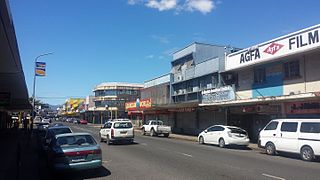
Lautoka is the second largest city in Fiji. It is on the west coast of the island of Viti Levu, in the Ba Province of the Western Division. Lying in the heart of Fiji's sugar cane-growing region, the city has come to be known as the Sugar City. Covering an area of 32 square kilometres, it had a population of 71,573 at the 2017 census, the most recent to date.

Tourism in Croatia is a major industry of country's economy, accounting for almost 20% of gross domestic product (GDP).
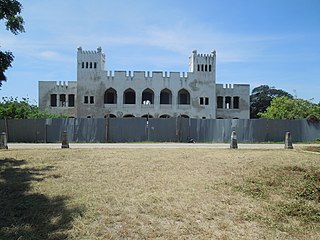
Bagamoyo, Tanzania, is a town founded at the end of the 18th century, though it is an extension of a much older settlement, Kaole. It was the capital of German East Africa and was one of the most important trading ports along the East African coast along the west of the Indian Ocean. Today, it is the capital of the Bagamoyo District. In 2011, the town had 82,578 inhabitants.
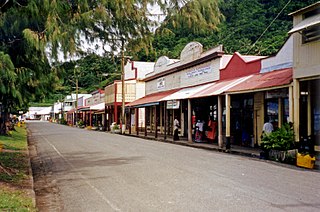
Levuka is a town on the eastern coast of the Fijian island of Ovalau, in Lomaiviti Province, in the Eastern Division of Fiji. Prior to 1877, it was the capital of Fiji. At the census in 2007, the last to date, Levuka town had a population of 1,131, about half of Ovalau's 8,360 inhabitants. It is the economic hub and the largest of 24 settlements on the island. Having been nominated decades prior, Levuka was designated a UNESCO World Heritage Site in June 2013, in recognition of the port town's exceptional testimony to the late colonial port towns in the Pacific.

Notre Dame Cathedral is a 20th-century church that serves as the cathedral of the Roman Catholic Diocese of Taiohae or Tefenuaenata. It is located in the Meau Valley near the capital centre on the island of Nuku Hiva.

The Cathedral of St. Anastasia is the Roman Catholic cathedral of Zadar, Croatia, seat of the Archdiocese of Zadar, and the largest church in all of Dalmatia.

Khan al-Umdan is the largest and best preserved caravanserai in Acre, Israel. Located in the Old City of Acre, it is one of the prominent projects constructed during the rule of Ahmed Jezzar Pasha in Galilee, under the Ottoman era.

Honiara is the capital and largest city of the Solomon Islands, situated on the northwestern coast of Guadalcanal. As of 2021, it had a population of 92,344 people. The city is served by Honiara International Airport and the seaport of Point Cruz, and lies along the Kukum Highway.
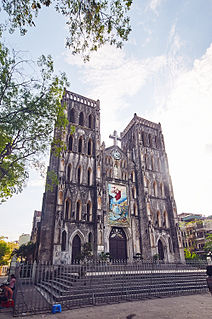
St. Joseph's Cathedral is a church on Nha Chung Street in the Hoàn Kiếm District of Hanoi, Vietnam. It is a late 19th-century Gothic Revival church that serves as the cathedral of the Roman Catholic Archdiocese of Hanoi. The cathedral was named after Joseph, the patron saint of Vietnam.

Sacred Heart Church is a Roman Catholic church in the seaside resort of Blackpool, Lancashire, England, on Talbot Road close to the town centre. It was the first Roman Catholic church built in Blackpool and has been designated a Grade II* listed building by English Heritage.

The Our Lady of Lourdes Church is located in the city of Tiruchirapalli in the state of Tamil Nadu, India. Built in the Gallo-Catholic design, the Church is devoted to Our Lady of Lourdes. The church is considered one of oldest of the 22 churches in the city which are older than 100 years. The church is located in the premises of St. Joseph's College Higher Secondary School, Trichy. The church is one of the major landmarks in the city.
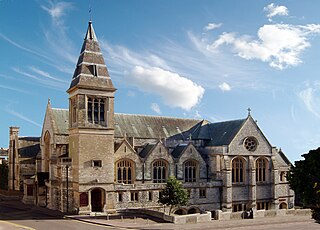
The Catholic Church of the Sacred Heart, or Sacred Heart Church, is a Roman Catholic church in the seaside resort of Bournemouth, England. Located on Albert Road close to the town centre, it was the first Roman Catholic church built in Bournemouth and is part of the Diocese of Portsmouth. It has been designated a Grade II listed building by English Heritage.

Sacred Heart Church in St Kilda, Melbourne, is of architectural, aesthetic and historical significance to the state of Victoria in Australia. The church, which was built in stages, is one of the major landmarks of St Kilda.

Wimborne Minster astronomical clock is a fourteenth-century astronomical clock in Wimborne Minster in Dorset, regarded as "one of the most ancient working clocks in Europe."

St Mary's Roman Catholic Church is a heritage-listed church at 271–275 Adelaide Street, Maryborough, Fraser Coast Region, Queensland, Australia, on land donated to the Church by Maryborough pioneer James Cleary. It was initially designed by Charles Tiffin with later additions and alterations by Francis Drummond Greville Stanley and POE Hawkes. The initial construction was from 1869 to 1872 by G Smith and J Thomas. It was added to the Queensland Heritage Register on 21 October 1992.

The Church of Saint Wenceslas is a Roman Catholic church in Vršovice in Prague 10, Czech Republic. The church was built in 1930 as a commemoration of the 1,000th anniversary of the death of St. Wenceslas.
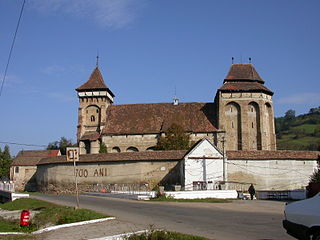
The Valea Viilor fortified church is a Lutheran fortified church in Valea Viilor (Wurmloch), Sibiu County, in the Transylvania region of Romania. It was built by the ethnic German Transylvanian Saxon community at a time when the area belonged to the Kingdom of Hungary. Initially Roman Catholic, it became Lutheran following the Reformation. Together with the surrounding village, the church forms part of the villages with fortified churches in Transylvania UNESCO World Heritage Site.

Sacred Heart Cathedral is a heritage-listed Roman Catholic cathedral at 266 Stanley Street, Townsville CBD, City of Townsville, Queensland, Australia. It was built from 1896 to 1902 by Dennis Kelleher. It is also known as Church of the Sacred Heart. It was added to the Queensland Heritage Register on 21 October 1992.
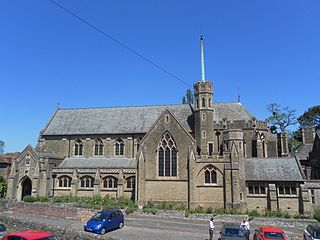
Sacred Heart Church is a Roman Catholic Parish church in Petworth, West Sussex, England. It was built in 1896 and designed by Frederick Walters. It is situated on Angel Street to the north of Petworth Cottage Museum in the centre of the town. It is a Gothic Revival church and a Grade II listed building.

Our Lady of the Sacred Heart Church is a heritage-listed Roman Catholic church at 120 Douglas Street, Thursday Island, Shire of Torres, Queensland, Australia. It was built from c. 1885 to c. 1905. It was added to the Queensland Heritage Register on 7 December 1998.





















